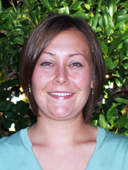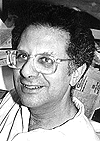
Hello, and welcome to the Fall 2009 edition of the Member Profiles section of the SARAH newsletter!
In this edition, we introduce you to Emily Wright, an Assistant Professor at the University of South Carolina interested in female offenders and intimate partner violence, and David Greenberg, a Professor in the Sociology Department of New York University originally trained as a theoretical physicist (yes, physicist!!) whose work and projects focus on Marxist criminology, women and capitalism, and sexuality.
We choose people to profile using a random number generator (really!), but if you have suggestions for DWC members or significant contributors to the field of women and crime that you would like to see profiled, please contact Venezia Michalsen at michalsenv@mail.montclair.edu or Alana Van Gundy-Yoder at yoderal@muohio.edu . We would enjoy hearing from you!
Until next edition,
Venezia and Alana
 EMILY WRIGHT
EMILY WRIGHT
How did you become interested in the field of women and/or gender and crime?
I’ve always been interested in relationships. As an undergrad psychology student, I enrolled in several independent studies in order to do small research projects surveying other psychology students about their dating relationships and relationships with family members. With the help of a professor of mine, I obtained a grant to study relational aggression among college students and after that I was hooked on how relationships were tied to aggression/violence. In graduate school at the University of Cincinnati, I was fortunate enough to work with Pat Van Voorhis on her women offenders’ classification project, and also work with Mike Benson regarding intimate partner violence. Their mentorship helped shape my two primary areas of research, intimate partner violence and female offenders (in both of these areas, I tend to focus on the roles of good and bad relationships for women, and how this affects their offending and victimization).
How do you define yourself as a scholar/activist/educator?
My mom once predicted that I would always be a student of some sort because I loved learning so much – she was probably right! I see myself sort of as a perpetual student – I love studying things, doing research, and talking about related issues with other people. Right now in my career, I am trying to maintain a balanced approach to research, education, and activism. I recently gave a presentation to the South Carolina League of Women Voters about the victimization experienced by female offenders; I believe that my biggest contribution to activism and education may eventually come through conducting research and promoting evidence-based policies regarding intimate partner violence/victimization and/or women offenders.
What are your current projects or interests?
All of my current projects revolve around relationships and violence. I’m currently examining how neighborhood characteristics (disadvantage, social ties, etc) impact intimate partner violence. I’ve also examined and continue to work on the roles of relationships among female offenders – in terms of how relationships operate as both risk and protective factors for females. Finally, I’ll soon be looking at how exposure to IPV affects children and adolescents’ various problem behaviors (e.g., their own use of violence).
Who is your favorite person (or animal!) to spend time with, and what are your favorite things to do when you are with them?
I love spending time with my husband Ben and our Yorkie, Siggy. We are enjoying the fall in South Carolina by watching a lot of college football and hanging outside in the evenings (yes, Siggy watches football and cheers for our teams, too!). When we’re inside (and not working), I really love playing games –I grew up playing dominoes with my family and have now incorporated many of Ben’s family’s favorite card games, too. With the holidays coming up, we should have plenty of family and friends around to play against!
How do you wind down after a stressful day?
With a glass of wine and a nice dinner, followed by a walk to the river with the dog! Things always seem a bit better with fresh air. I find that talking about what might be stressing me out is helpful – and I have several supportive people to talk to when needed. If I’m still stressed the next day, a nice run can usually settles me down.
What obstacles do you feel you have overcome to be where you are today?
I am the first from my family to receive a Ph.D., so I think I have mostly had to convince my family what I do and why. This is particularly true of research obligations instead of teaching obligations. My family has been incredibly supportive of my goals, but I don’t think they always understand why I like to do research – but I don’t blame them for not understanding what’s exciting about writing papers or reports or obsessing over data for days! I don’t feel that it has been necessarily an “obstacle” for me, but it has been a somewhat difficult realization.
What would you like to be remembered for?
Oh, great question! At this point in my career, I don’t really know what I might be remembered for – it’s too early think about a particular legacy. Who knows what will have happened in 20+ years? In the meantime, I hope that I am always true to my values and beliefs, that I practice tolerance and understanding, and that I continue to work hard at everything I do.
What is one of your lifelong goals?
I think that a real goal of mine is to “stop and smell the roses” – I want to enjoy life, and I tend to enjoy things when I’m learning something. So, I have a list of activities, games, hobbies, etc, that I want to learn (or refine) over time. For instance, I want to learn to play golf and I want to refine my cooking skills (at least to a competent level!). I’m hoping to take a golf class this year from USC and would also love to take a cooking class with Ben.
For more information on Emily Wright, please visit: http://www.cas.sc.edu/crju/faculty/wright/wright.html  DAVID GREENBERG
DAVID GREENBERG
How did you become interested in the field of women and/or gender and crime?
Early in my career I wanted to examine the potential and limitations of Marxist theory for understanding different crime patterns that were not obvious choices for Marxism to explain. I chose to tackle the hard cases, and picked the age-crime relationship, which in the mid-seventies, had received little theoretical attention even though everyone knew that the relationship was a strong one. I ignored gender issues because there seemed to be such obvious reasons why women would commit fewer crimes than men, that there seemed to be little that Marxism could add. When it came time to prepare a second edition of my anthology, Crime and Capitalism: Readings in Marxist Criminology, gender had become too important a topic to be neglected, so I asked a prominent leftist feminist criminologist to write an essay on the gendering of crime from a Marxist perspective. She agreed to do so, but after some months, informed me that she hadn’t been able to do it. Malcolm Feeley gave me an opening for addressing this issue when he told me that he had discovered remarkably high levels of female crime in the trial records of London’s Old Bailey court in the 18th century. I and one of my graduate students, Annette Sroka, then read the trial records from the late 17th century into the early 20th century and confirmed Feeley’s findings that the ratio of females to males had peaked in the 1740s and then declined slowly. Our paper drew on Eli Zaretsky’s Capitalism, the Family and Personal Life, which argues that the development of capitalism had consequences for women’s involvement in the paid labor force, to make sense of this decline. Most of my criminological work does not focus on gender, but it does enter into work on sexuality.
How do you define yourself as a scholar/activist/educator?
I am not much concerned with defining myself, but for the last three decades my work has left me very little time for activism. My hours are taken up with teaching and research. I would like to think that there is some social benefit in equipping students to think competently about social issues, but I am not overly optimistic about the impact I can make in that regard. Some of my research and writing have a political agenda, but once something is published the author has little control over how it is used. Some of my early criminological writings, I think, may have been counter-productive. I consider scientific inquiry to be worthwhile for its own sake, and do not undertake it with a political agenda.
What are your current projects or interests?
I recently completed a paper dealing with men who have sexual relations with adolescent males who are under the age of consent, but am having trouble getting it published because publishers fear controversy. Work now in progress includes a study of capital punishment in Trinidad & Tobago (with Biko Agozino), criminal career research (with Mike Ezell), a theoretical paper on the role of motivation in criminological theory, a study of the consequences of Megan’s law (with Alissa Ackerman-Acklin and Meghan Sacks), a study of the adoption of capital punishment sentencing provisions in the U.S. after the Furman decision (with Valerie West), and a study of the careers of capital composers (with Jillian Powers).
What obstacles do you feel you have overcome to be where you are today?
Never having taken a course in sociology created an obstacle to a theoretical physicist getting a job as a sociology professor, but my university was, fortunately for me, forgiving of my sordid past.
What would you like to be remembered for?
My political work (civil rights, anti-war/draft resistance activity during the 1960s, prisoners’ rights advocacy starting in the 1970s) and my sociological work taken in its totality. I have tried to do this work with a sense of seriousness and integrity that I hope is evident to the reader.
For more information on David Greenberg, please visit: http://sociology.fas.nyu.edu/object/davidgreenberg.
